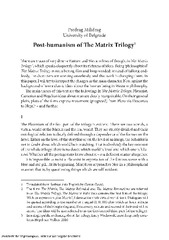Приказ основних података о документу
Post-humanism of The Matrix Trilogy
| dc.contributor | Deretić, Irina | |
| dc.contributor | Sorgner, Stefan Lorenz | |
| dc.creator | Predrag, Milidrag | |
| dc.date.accessioned | 2018-03-25T12:40:11Z | |
| dc.date.available | 2018-03-25T12:40:11Z | |
| dc.date.issued | 2016 | |
| dc.identifier.isbn | 10: 3631662580 | |
| dc.identifier.isbn | 13: 978-3631662588 | |
| dc.identifier.uri | http://rifdt.instifdt.bg.ac.rs/123456789/1486 | |
| dc.description.abstract | There are traces of very diverse Eastern and Western lines of thought in The Matrix Trilogy2, which speaks eloquently about its richness of ideas. Being ‘philosophical’ The Matrix Trilogy is not a boring film and long-winded; instead of talking endlessly, the characters are working ceaselessly, and that work is changing them. In this paper, I will try to interpret the changes in the main character, Neo, against the background of some classic ideas about the human being in Western philosophy. The main theses of this text are the following: In The Matrix Trilogy, Platonist, Cartesian and Hegelian ideas about man are clearly recognizable. On their general plain, plots of the films express movement (progress?) from Plato via Descartes to Hegel3 – and further. | en |
| dc.language.iso | en | sr |
| dc.rights | openAccess | sr |
| dc.rights.uri | https://creativecommons.org/licenses/by/4.0/ | |
| dc.source | From Humanism to Meta-, Post- and Transhumanism? | sr |
| dc.subject | Hegel | sr |
| dc.subject | Descartes | sr |
| dc.subject | Platon | sr |
| dc.subject | Matrix Trilogy | sr |
| dc.subject | Marx | sr |
| dc.title | Post-humanism of The Matrix Trilogy | en |
| dc.type | bookPart | sr |
| dc.rights.license | BY | sr |
| dcterms.abstract | Предраг, Милидраг; | |
| dc.citation.spage | 307 | |
| dc.citation.epage | 320 | |
| dc.type.version | publishedVersion | sr |
| dc.identifier.fulltext | http://rifdt.instifdt.bg.ac.rs/bitstream/id/2983/Post-humanism.pdf | |
| dc.identifier.rcub | https://hdl.handle.net/21.15107/rcub_rifdt_1486 |

